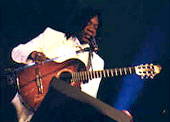CROONER 2000

In his own words, Milton Nascimento defined Crooner as being the return of the "new old Milton". The musicians, technitians, producers and other professionals envolved in this work, have today the privilege of watching from the front row the meeting of both: the old Milton, who jumped from small stages in Minas Gerais' countryside onto some of the most important ones in the world; and the new Milton, more handsome, happier, at peace with music and life, singing better and better than before. In both, the strenght of the extraordinary talent that knocked down limits and powered through frontiers, the obssession for getting it done right, the pleasure in detail, the care and respect for friends and workmates. We, the crew of Crooner, thank Milton Nascimento for the opportunity to be present in this ball. Have no doubt: the pleasure is all ours. We also thank everyone (and there were many people) who have helped us one way or another to build this show:
Marilene Gondim and the Tribe
June 1999
MILTON NASCIMENTO
CROONER - NOS BAILES DA VIDA
In this end of millenium, such a simbolic switching of dates, Milton Nascimento is finally doing himself justice and letting himself be taken over by the boy and crooner Bituca, the skinny big boy of the sixties, bass player and singer of the most asked for songs in the old ballrooms of life.
In a very particular flashback, Milton gifts us with this brilliant concert, CROONER, already proclaimed the Year 2000 New Year's Eve event to be. No political or ideological considerations, whether big or small. No socio-ecological hues, whether subtle or harsh. And even less mystical or religious revelations of any kind or size.
Just some good-old dancing cheek to cheek songs, like the ones at the parties at Levy building or Pampulha night club, straight out of the time tunnel.
Things he started singing in the 50's, in the times of 4 bass accordion, which didn't have the musical accidents and required that he filled in the missing notes with his voice. Behind the bushes, Wagner Tiso heard it all and made plans: - one day, I'll bring this kid to my balls... One day, he did do so, and there they went, two underage boys, to play professionally, hiding from the local offices. When there was a raid conducted by the "men of law", both piano player and crooner would hide in the kitchen, a fantastic place, where they found guaraná and finger food.
Very well. Today, Bituca wants and has to pay homage, before anything else, to his past, how far and long he has come in this path. He means to highlight that, though he is now another, he is still that same boy with the short pants, who once watched at Tijuca Tennis Clube a concert by Marcio Mascarenhas, and nearly died from the thrill brought when those five thousand accordions began to play.
Bituca had his first brush with big city professional musicians in Belo Horizonte, at the Berimbau nightclub, at the Maletta building, a place where everyone performed and played the songs he himself and Wagner used to play, but in a totally different way from theirs. Young Bituca was desperate. He said: "Dang! I've gotta learn everything all over again!!" At this time he was playing with my brother Marilton, and told him: "I gotta change it all up again, gotta learn it all over again" and then Marilton replied: "you're crazy! You gotta play that way!"
It was better than the original.
"I wound up befriending all other musicians in Belo Horizonte, and the general atitude was the same as Marilton's. People would go crazy with the things we played. For instance, "Blue Moon", which was played by everyone a certain way, Wagner played in a completely different one, which seemed like the song was being played backwards, because "Blue Moon" is in Major scales and he played on a Minor one. In Rio he was known as the Blue Moon piano player.
Who speaks this way, is that Bituca from when he sang "Aqueles Olhos Verdes", with his eyes shut, a song he learned from D. Lillia, his mother, whom he now tributes with this piece. This concert is just like him. Absolutely his own free decision. The tribute given by Bituca, anonymous musician, to the thousands of anonymous musicians who one day dreamt of being - themselves - the like of MILTON NASCIMENTO.
Marcio Borges, 1999.
